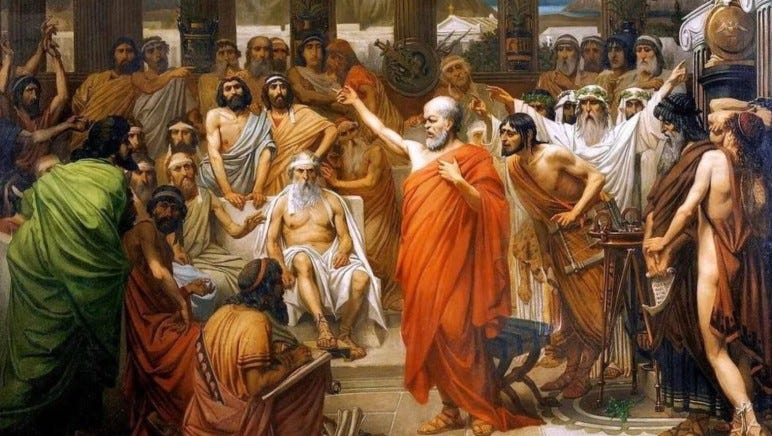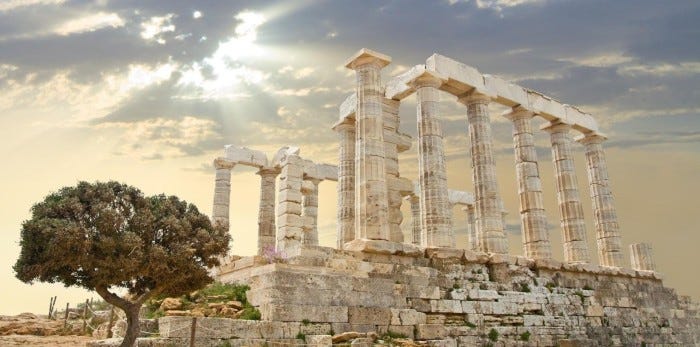This is a guest post by WD James.
In this series we have been exploring how in his Apology, Plato presents his mentor Socrates as a new sort of hero. Heroes fight monsters and previously we looked at who the monsters in this case were: those who subordinate truth to power.
This time we’ll look at Socrates’ trial itself; the field of his combat.
Democratic justice
The city-state of Athens was much more genuinely democratic than our modern representative democracies. Many positions were filled by lot, with all citizens given the opportunity to hold offices (and expected to do so). Further, all citizens would perform military duty.
On the positive side, ‘the will of the people,’ as expressed in democratic assemblies and procedures, predominated. Of course, slaves, women, children, resident aliens, etc… were not represented, but at least adult male citizenship was broad spread. Even poor Athenian males bore arms, with ‘democracy’ essentially meaning the people in arms (you don’t provide people you don’t basically respect arms and training to use them).
On the negative side, these assemblies of unevenly educated and diverse citizens could be easily manipulated by demagogues. The sophists, who we looked at earlier, were the professionals of teaching the arts of persuasion; to enable one to bend the will of the assemblies. There are professional speakers amongst Socrates’ accusers. Several times he notes he is not good at speaking; he isn’t polished, he’s just authentically looking for the truth.
These elements, positive and negative, are reflected in Socrates’ trial. First and foremost, he has 500 jurors who would have formed a truly representative assembly of Athenians. He is in a real sense being judged by the city and, as we will see, is judging that city in turn.
Second, there is no judge or lawyers. These sort of legal ‘experts’ would have been seen as antithetical to the democratic ethos of the city. The jury will listen to the arguments of the people pressing charges and the defense offered by the accused. Then they will first vote on the verdict: guilty or not. If not, the ‘prosecutors’ might actually be punished. If there were less than 100 guilty votes, they would be assessed a fine to cover court costs. If guilty, then they will vote again on the sentence. There are no law books or sentencing guidelines governing this. The prosecuting party will propose a sentence and the defendant will do likewise and the jury will choose between them.
The positive here is that the jury might apply common sense, can be flexible, and might actually achieve justice, not just legal maneuvering. The negative is that the smooth-tongued and cunning may well be able to persuade the jury to do their will.
Socrates is on trial. However, Athens is also present in all its glory and characteristic faults, so it is also on trial.
The battle
We have looked at some of the content of Socrates’ defense speech in previous essays and will look at the rest in future essays. Here we will focus on the drama of the trial: on what happens more than on what was said.
As the main part of the trial leading to a verdict wraps up, Socrates refuses to bring his weeping wife or young children before the court or to otherwise appeal to their emotions to show him mercy. To do so, he says, would be “impious” and a “disgrace” (35a). The point of the trial, in Socrates’ view, is to figure out if he is guilty of a crime; ultimately to determine if he is harmful to the city or not. To make an emotional appeal would sin against justice and truth. Further, Socrates is defending his lifestyle as a ‘philosopher,’ a lover of wisdom. Either that way of life is itself justified or it is not. To give up on its principled defense would subject him to individual disgrace.
The jury convicts him on a vote of 280 to 220. Relatively close (and Socrates is pleased it was that close), but a modern politician would claim it was a landslide.
Now the trial moves on to the sentencing phase. There is clearly a game that is meant to be played here that a modern ‘decision theorist’ would have fun mapping out for us. The prosecuting people (Meletus, Anytus, and Lycon, in this case) propose death as the penalty. Now, the defense is supposed to think something like the following. They were just convicted so they know the jury is against them. How against them was it? If it was close, maybe a majority would support a relatively lenient sentence; if it was very lopsided they are probably going to want a harsher sentence.
So, the defendant is meant to play a game. They presumably want as lenient a sentence as possible, but they have to choose something the jury will accept or they will vote for the penalty proposed by the prosecution. In this case, what can Socrates propose that is less harsh than death but harsh enough to get 31 of the ‘guilty’ voting members to accept his alternative?
Pretty clearly, within the overall context, Socrates is supposed to propose exile as his punishment. This would also fit in with the general sense that people just dislike him because he is a nuisance rather than that they really hate or fear him as a danger.
Not playing games
But Socrates refuses to play the game.
He again summarizes the intent of his activity as a lover of wisdom and questioner of authority and custom: “I set myself to do you individually in private what I hold to be the greatest possible service: I tried to persuade each one of you not to think more of practical advantages than of his mental and moral well-being…” (36c). Socrates had been trying to get them to not play power games, but to deal with substance. How then can he now, in good faith, play their games?
What does Socrates propose as the alternative to death as a sentence? He asks what would be just? He has been a positive influence on the city, as he sees it, so he cannot justly propose that he would be harmed. Justice would demand he be recognized as a benefactor. “Well, what is appropriate for a poor man who is a public benefactor and requires leisure for the purpose of giving you moral encouragement,” he asks? “Nothing could be more appropriate,” he goes on, “for such a person than free dining in the Prytaneum” (36d). The Prytaneum was the institution where Olympic champions would receive honor and dine at public expense as an expression of the people’s admiration and appreciation. It’s the basis for the Victor’s Village in The Hunger Games. Socrates is thinking in terms of what he actually deserves (what is just) and Plato is yet again bringing him into the realm of heroes and the heroic, though he is redefining what should count as a hero: a guy who threw a heavy object the furthest or a guy who tried to get the citizenry to be more moral and just?
One can visualize Socrates’ friends about to jump out of their skulls as the words come out of his mouth. The jury had just convicted him; they weren’t going to turn around and reward him. They don’t want to see Socrates condemned to death. They sort of pull him aside and tell him to propose a fine. Socrates explains to the jury that he can’t be expected to propose an unjust sentence, but he could afford to pay a fine of 100 drachmae (about 1/5 of his property) without really doing himself any harm. So, as if to say, ‘well, you cretins want a punishment, let me figure out a punishment that I won’t really notice.’
His friends are literally jumping out of their seats. Again, a quick word with Socrates. A ‘secret’ plan is hatched: they will pay a heavy fine; let Socrates propose that and maybe the jury will bite. Socrates turns to address the court. He looks like the biggest dumbhead ever, but he knows exactly what he is doing. He says, “One moment gentlemen. Plato here, and Crito and Critobulus and Apollodorus, want me to propose three thousand drachmae on their security. Very well, I agree to this sum, and you can rely upon these gentlemen for its payment” (38b). So, the deal he offers is essentially still no punishment for himself; his rich friends will pay a fine on his behalf.
The jury votes again and over two thirds support the death penalty.
Socrates observes “that the difficulty is not so much to escape death; the real difficulty is to escape from wickedness…” 39a).
Winning by losing
If, as we observed previously, Plato had initiated a perennial quarrel between philosophy and poetry, an even more fundamental one was initiated between philosophy and democracy. Plato never forgave the Athenian people. Himself an aristocrat, he would pin his political hopes on a moral aristocracy, not the people.
Socrates has revealed (what a trial aims at doing) that a legal fight is in fact a moral fight, as justice is a moral concept and fact.
His moral fiber has been tested and the moral fiber of his prosecutors and judges has as well. He has triumphed and they have been exposed. He has maintained his fidelity to truth; they have succumbed to the machinations of power and manipulation. He has run the race and come out ahead; fought the battle and prevailed.
Socrates is not just a victim of judicial malfeasance; he is a martyr. Our term ‘martyr’ derives from the Greek martur, witness. Earlier he had called a god to witness on his behalf. Now his own example bears witness to the truth.
All quotes are from: Plato, The Last Days of Socrates: Euthyphro, Apology, Crito, Phaedo, translated by Hugh Tredennick and Harold Tarrant, Penguin, 2003.








We are standing on the shoulders of giants. Socrates leading a social conscience with his words and his life. Much honor and respect.
What is sadly lacking in our social sphere today. Infinity is now. Act accordingly. Kman, DIGILEAK